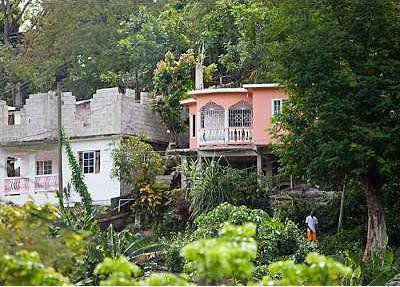It occurred to me when I was on a trip to Jamaica a few years ago. We’re really lucky in America to have building codes, established several years ago, that most houses on the market in just about any city must adhere to.
Many of those cities have adopted the International Building Codes (IBC) too. That means, if I were to move to a foreign country that has also adopted the IBC, I can be reasonably sure to get a similar quality built home as what I’m leaving behind.
It’s reasonable to assume that a modern building built under the IBC won’t collapse on your head the minute the wind picks up, that the foundation won’t heave when it gets cold outside, and the windows and doors won’t leak if a storm blows in.
Interestingly, just because so many cities all over the world have adopted the IBC, houses do not look exactly the same everywhere. Sizes, colors, roof lines, number of stories, exterior and interior details are still varied depending on what the important considerations are in those areas. That’s because standards aren’t step-by-step instructions.
So, it’s puzzling that when it comes to discussing standards for education, Common Core Standards are so misunderstood. But with school administrators like Hoisington’s Meg Wilson jumping on the anti-Common Core bandwagon, it’s no wonder it’s tough for voters to see the issue clearly. After all, she is a trusted and respected administrator, albeit one that has left many who thought they knew where she stood on curriculum puzzled.
“I am against Common Core, as I believe we must have local control of our school system. A one-size-fits-all approach to education is not the best policy for our children or for Kansas. We must make sure Kansas is competitive with other states, and the way to do that is to set our own education standards,” Wilson recently wrote on Facebook.
Here is a problem with that argument. Adopting Common Core Standards enhances local control. It allows a district to build a quality education system that will stand up to comparison with other quality education systems. It provides a framework by which to measure quality.
While traveling in Jamaica, we saw several homes built on the hillsides near Montego Bay. As the people could afford to, they would add one room at a time, and it could take many years to complete them. Despite the decorative greek columns and bright colors of some, there was no running water. With no building standards, and no building inspectors, the word that best described the neighborhoods was chaotic.
If America wants its young people to compete equally on a global scale, some sort of common standard for what a quality education is needs to be agreed upon. We can’t expect our young people to garner the professional respect of the rest of the world without some sort of measurement standard. Without the standards, our schools are as good as a neighborhood of Jamaican cement shacks on a precarious hillside. While they may not be perfect, Common Core Standards are at least a good start.
Veronica Coons is a Tribune staff reporter. She can be reached at vcoons@gbtribune.com.
Standards provide peace of mind




